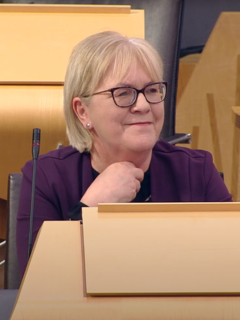Proportional representation (PR) characterizes electoral systems in which divisions in an electorate are reflected proportionately in the elected body. The concept applies mainly to geographical and political divisions of the electorate. For instance in the European parliament, each member state has a number of seats that is (roughly) proportional to its population, enabling geographical proportional representation. Almost all European countries also have political proportional representation : When n% of the electorate support a particular political party or set of candidates as their favorite, then roughly n% of seats are allotted to that party or those candidates. The essence of such systems is that all votes contribute to the result—not just a plurality, or a bare majority. The most prevalent forms of proportional representation all require the use of multiple-member voting districts, as it is not possible to fill a single seat in a proportional manner. In fact, PR systems that achieve the highest levels of proportionality tend to include districts with large numbers of seats, as large as a province or an entire nation.

The single transferable vote (STV) is a voting system designed to achieve or closely approach proportional representation through the use of multiple-member constituencies and each voter casting a single ballot on which candidates are ranked. The preferential (ranked) balloting allows transfer of votes to produce proportionality, to form consensus behind select candidates and to avoid the waste of votes prevalent under other voting systems. Another name for STV is multi-winner ranked-choice voting.

Electoral reform in New Zealand has, in recent years, become a political issue as major changes have been made to both parliamentary and local government electoral systems.

The Electoral Reform Society (ERS) is an independent campaigning organisation based in the United Kingdom which promotes electoral reform. It seeks to replace the first-past-the-post voting system with one of proportional representation, advocating the single transferable vote. It is the world's oldest operating organisation concerned with political and electoral reform.
The alternative vote plus (AV+), or alternative vote top-up, is a semi-proportional voting system. AV+ was devised by the 1998 Jenkins Commission which first proposed the idea as a system that could be used for elections to the Parliament of the United Kingdom.
Canada holds elections for legislatures or governments in several jurisdictions: for the federal (national) government, provincial and territorial governments, and municipal governments. Elections are also held for self-governing First Nations and for many other public and private organizations including corporations and trade unions. Municipal elections can also be held for both upper-tier and lower-tier governments. Formal elections have occurred in Canada since at least 1792, when both Upper Canada and Lower Canada had their first elections.
In Ireland, direct elections by universal suffrage are used for the President, the ceremonial head of state; for Dáil Éireann, the house of representatives of the Oireachtas or parliament; for the European Parliament; and for local government. All elections use the proportional representation by means of the single transferable vote (PR-STV) in constituencies returning three or more members, except that the presidential election and by-elections use the single-winner analogue of STV, elsewhere called instant-runoff voting or the alternative vote. Members of Seanad Éireann, the second house of the Oireachtas, are partly nominated, partly indirectly elected, and partly elected by graduates of particular universities.

Johann MacDougall Lamont is a Scottish Labour Co-operative politician who served as Leader of the Scottish Labour Party from 2011 to 2014. She was previously a junior Scottish Executive minister from 2004 to 2007 and Deputy Leader of the Scottish Labour Party from 2008 until her election to the leadership in 2011. In addition to her ministerial and leadership roles, she has been a campaigner on equality issues and violence against women throughout her political career.
Historically, the single transferable vote (STV) electoral system has seen a series of relatively modest periods of usage and disusage throughout the world; however, today it is seeing increasing popularity and proposed implementation as a method of electoral reform. STV has been used in many different local, regional and national electoral systems, as well as in various other types of bodies, around the world.
The Scottish Liberal Democrats is a liberal, federalist political party in Scotland, a part of the United Kingdom Liberal Democrats. The party currently holds 4 of the 129 seats in the Scottish Parliament and 4 of the 59 Scottish seats in the UK House of Commons.

The 2011 Scottish Parliament election was held on Thursday, 5 May 2011 to elect 129 members to the Scottish Parliament.

Stuart McMillan is a Scottish politician serving as Convener of the Delegated Powers and Law Reform Committee since 2021. A member of the Scottish National Party (SNP), he has been the Member of the Scottish Parliament (MSP) for the Greenock and Inverclyde since 2016, having previously represented the West of Scotland region from 2007 to 2016.
There are a number of complications and issues surrounding the application and use of single transferable vote proportional representation that form the basis of discussions between its advocates and detractors.
Scotland's electoral system is considered the most proportional in the United Kingdom. Historically, only First Past the Post (FPTP) was used for elections in Scotland, but this changed at the inception of the devolved Scottish Parliament in 1999. All of the devolved legislatures in the United Kingdom - the Scottish Parliament, the Northern Irish Assembly and the Senedd - use the Additional Members System (AMS). AMS has been used for every Scottish Parliament election since 1999, with the most recent being in 2021.
Electoral reform is change in electoral systems to improve how public desires are expressed in election results. That can include reforms of:

There are five types of elections in the United Kingdom: elections to the House of Commons of the United Kingdom, elections to devolved parliaments and assemblies, local elections, mayoral elections and Police and Crime Commissioner elections. Within each of those categories, there may also be by-elections. Elections are held on Election Day, which is conventionally a Thursday. Since the passing of the Fixed-term Parliaments Act 2011 for general elections, all five types of elections are held after fixed periods, though early elections to parliament and the devolved assemblies and parliaments can occur in certain situations. The five electoral systems used are: the single member plurality system (first-past-the-post), the multi-member plurality system, the single transferable vote, the additional member system and the supplementary vote.

The United Kingdom Alternative Vote referendum, also known as the UK-wide referendum on the Parliamentary voting system was held on Thursday 5 May 2011 in the United Kingdom (UK) to choose the method of electing MPs at subsequent general elections. It occurred as a provision of the Conservative–Liberal Democrat coalition agreement drawn up in 2010 and also indirectly in the aftermath of the 2009 expenses scandal. It operated under the provisions of the Parliamentary Voting System and Constituencies Act 2011 and was the first national referendum to be held under provisions laid out in the Political Parties, Elections and Referendums Act 2000.

The 2016 Scottish parliament election was held on Thursday, 5 May 2016 to elect 129 members to the Scottish Parliament. It was the fifth election held since the devolved parliament was established in 1999. It was the first parliamentary election in Scotland in which 16 and 17 year olds were eligible to vote, under the provisions of the Scottish Elections Act. It was also the first time the three largest parties were led by women.

A referendum on electoral reform took place by mail-in ballot between October 22 and December 7, 2018, in the Canadian province of British Columbia. 61.3 percent of British Columbians voted in favour of maintaining the first-past-the-post voting system rather than switching to a proportional representation voting system, which was supported by 38.7 percent of voters.

Rural–urban proportional representation (RUP), also called Flexible District PR, is a hybrid proportional system designed by Fair Vote Canada with the intention of meeting the special challenges of Canada's geography, which includes wide-flung, sparsely populated areas. As conceived in general terms by Fair Vote Canada, the rural–urban proportional model combines the use of multi-member ridings and top-up seats to meet the different needs of both rural and urban areas, while protecting the objective of proportionality. Sweden, Denmark and Iceland use similar voting models.









